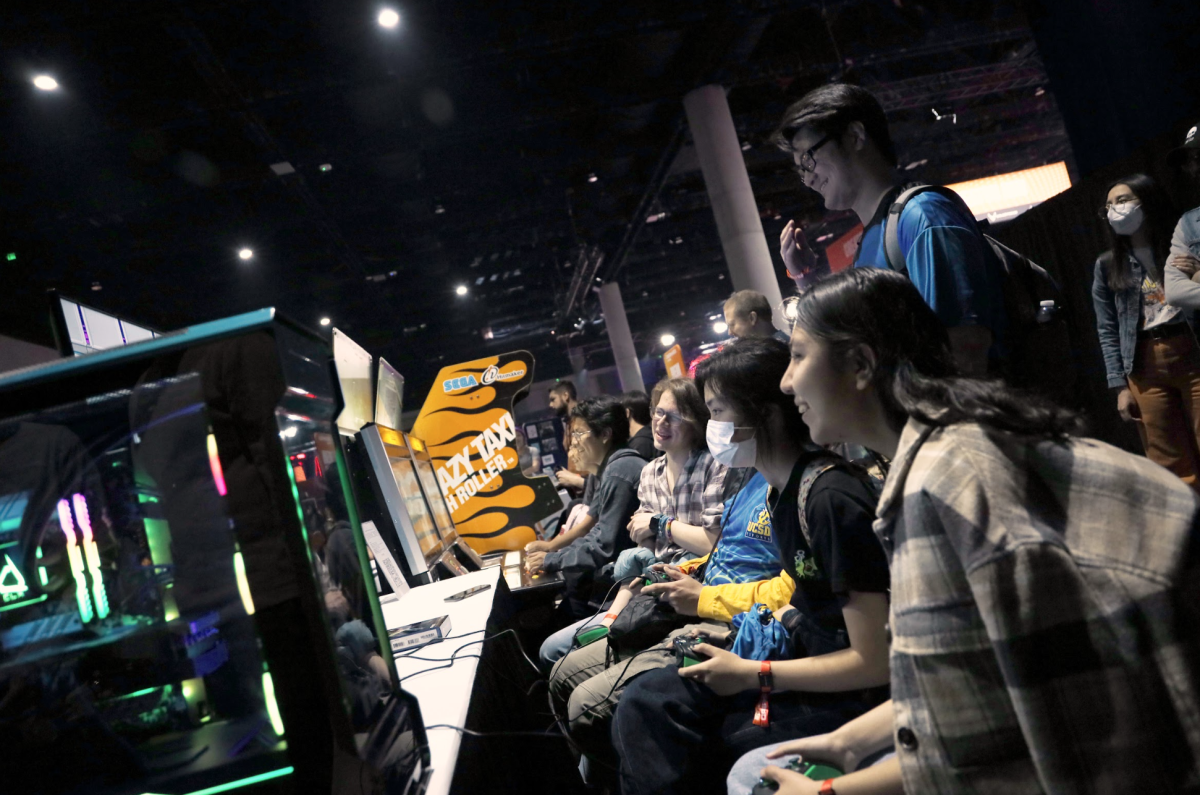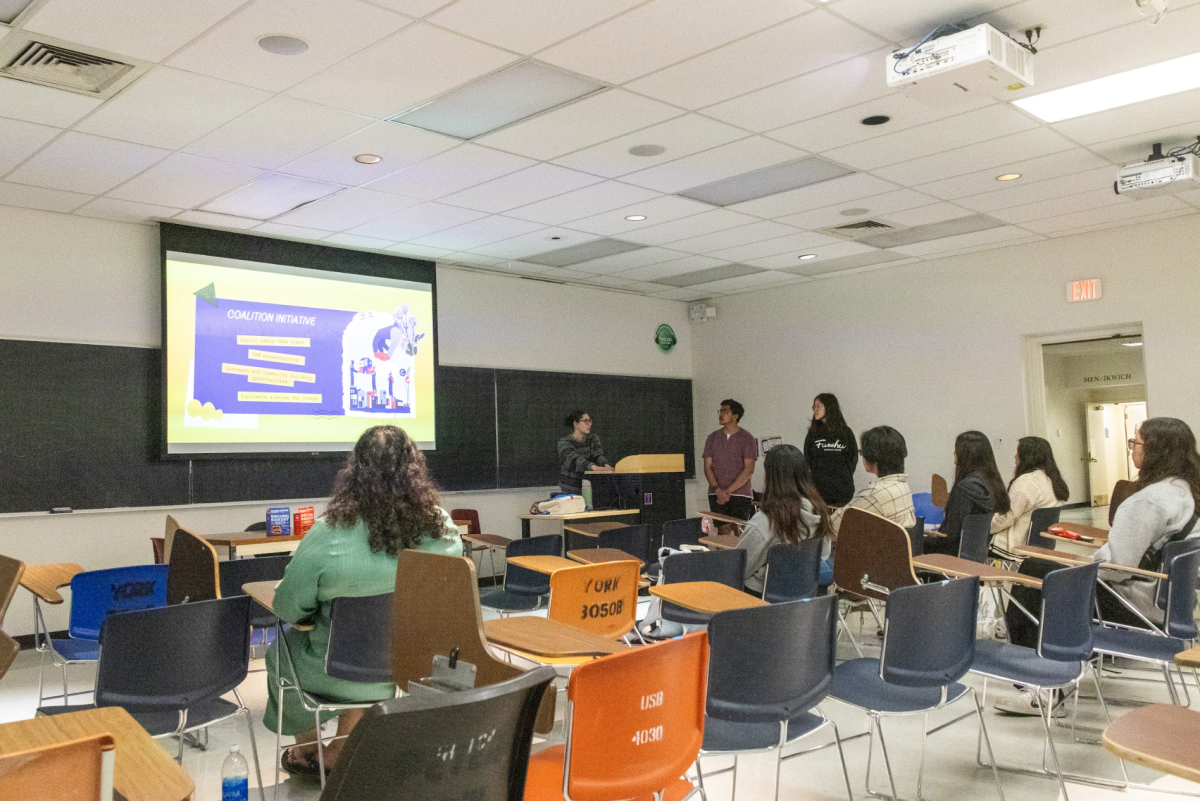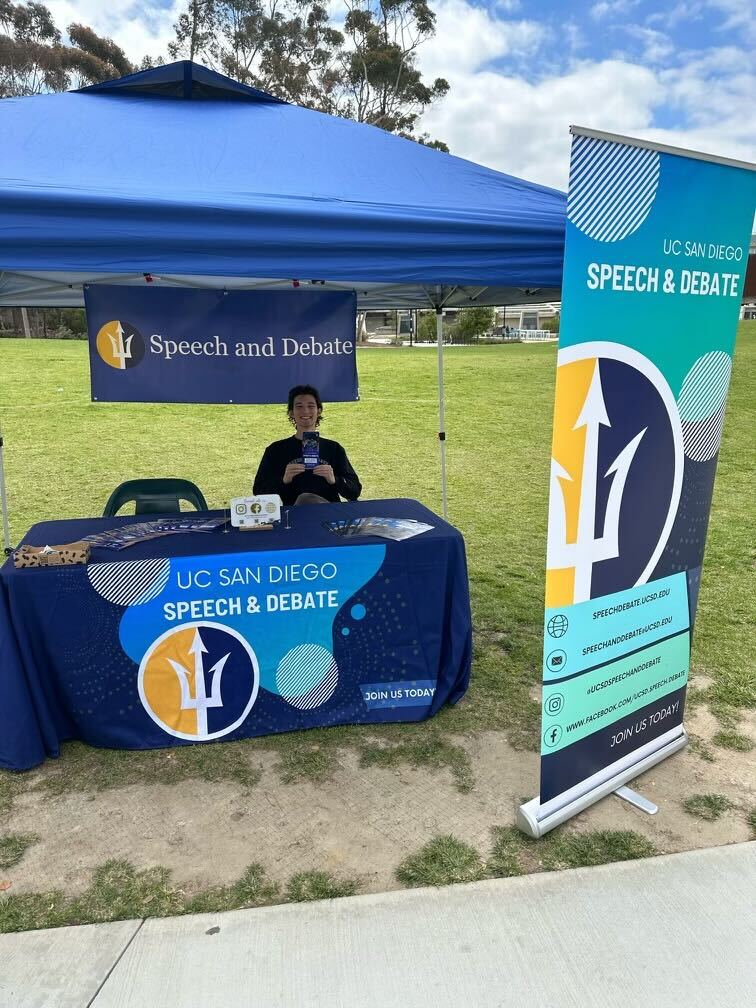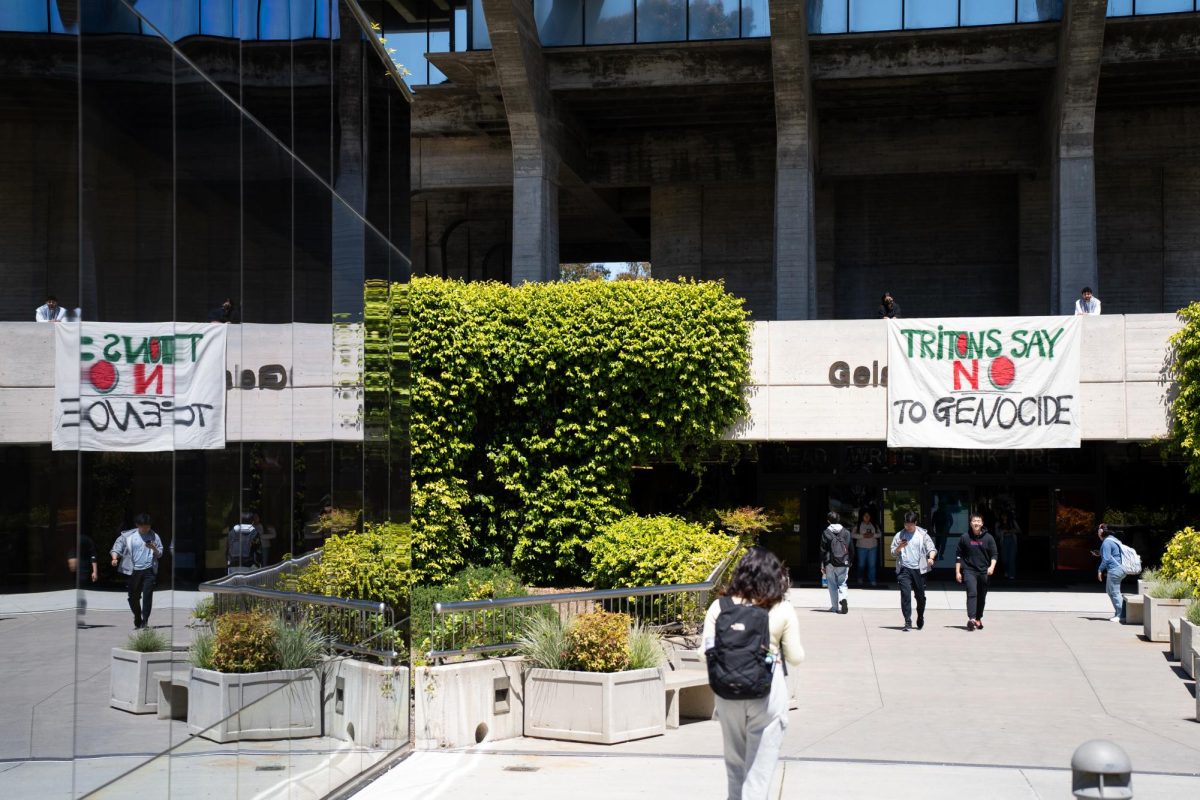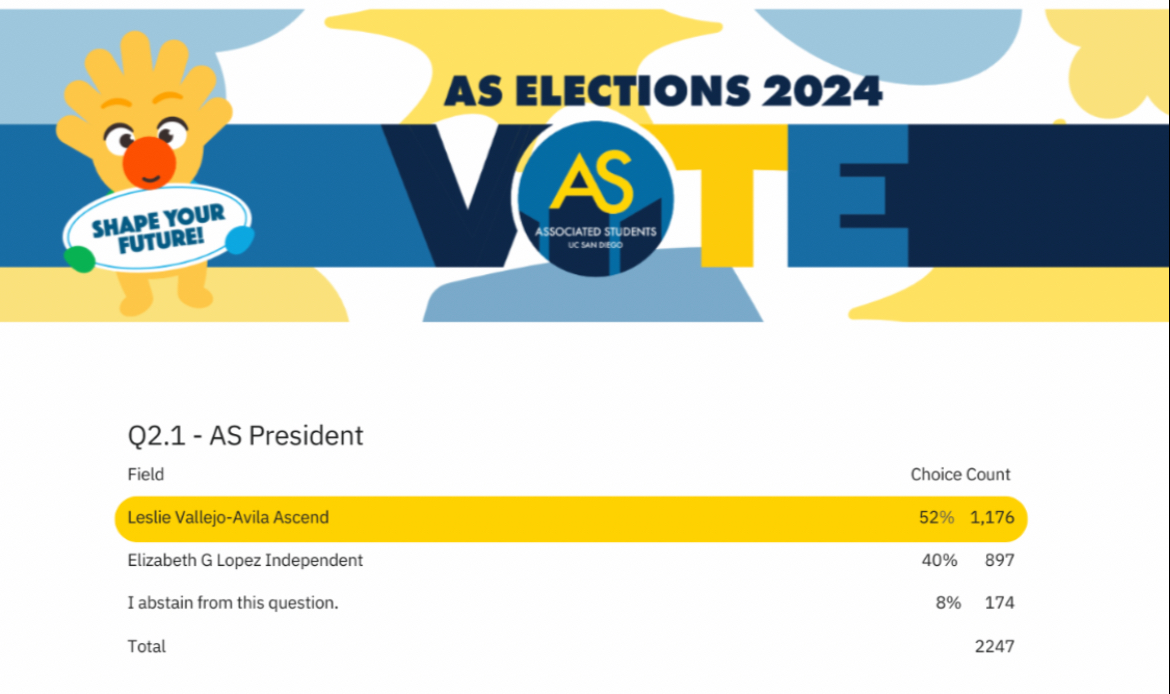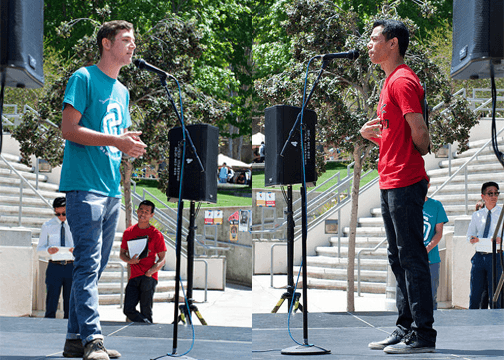
Last Friday, Dominick Suvonnasupa of Tritons United and Travis Miller of Students Determined went head-to-head on the most critical issues plaguing our campus. Here’s what they had to say.
Q: A.S. Council is not exactly a priority for students, with voting rates historically hovering around 20 percent. What are your concrete ideas to not only promote engagement during elections, but to get students increasingly more involved over the year?
Dominick Suvonnasupa:The problem is that there’s a huge population of students not getting their voices heard, so when A.S. [Council] listens to students, the problem is that it’s the same 20 percent over and over again, and it doesn’t accurately reflect the full beliefs and the needs of the students. So with the organizations I want to create in A.S. [Council] and it being more centered around students, we can go out to the student communities and really talk to them, really get an idea of what it is they need and what it is they want. That way, when we propose legislation changes or propose new ideas, we can meet with them via our liaison program. By doing this, we can reach a higher voting threshold and reach more students and get a more accurate representation of what we want and what we need.
Travis Miller: The lifeblood of our campus is not the [A.S. Council] —it’s the student orgs.What I want to do is institutionalize within A.S. [Council] quarterly visits for every single of the 435 student orgs on this campus. We want to reach out, we want A.S. [Council] to be going out every single week to multiple orgs, visiting them, talking to them … It’s been far too long since A.S. [Council] has sat on the fourth floor and governed. It’s time that A.S. [Council] is actually going out there, talking to people, and taking down their ideas … In this election, what we wanted to do is go student by student and invite people out, target the students we know don’t come out and vote … and prioritize their voices.
Q: UCSD has seen the closure of many important student spaces over the years including CLICS, the Craft Center, and most recently,the ongoing fight to protect the Che Cafe. What do you think is A.S. Council’s role in preserving such spaces, and what is your take personally on the continued existence of student-run and operated spaces?
TM: Student org and student-run spaces are the lifeblood of our campus. I think it was extremely problematic the way that A.S. [Council] handled the Che issue. A.S. [Council] should be continuously standing by the side of the students and not by anyone else… It’s time to support things like the Food Co-op, like Groundworks, like our other student spaces on campus and show them that we’re there for them, that we’re actually giving them the support. We need to re-emphasize and give back to the spaces other than Price Center … I want to make sure that we’re actually out there, that we’re actually transparent, that we’re actually visiting people … It’s not time to stay on the fourth floor and argue about these issues—it’s time to be on the ground and talk about these issues.
DS: I am a firm believer that we need to protect our student spaces. The only problem with our realization of the Che [Cafe] is that we are starting to get a sense that the larger community of UCSD students really isn’tutilizing the Che [Cafe]. Now, I’m not sure if that’s true or not, but what I want to do is restructure how the Che collective reaches out to students. If we can provide resources and materials for them to reach a larger audience so it benefits the larger student body, then I’m all for it. I believe that it is our job as leaders to not let our personal opinions get in the way but [to] really understand what our students need. If they want the Che Cafe, then I’m going to fight for it. But if it’s not producing enough utility to the student population, then perhaps there are other student communities that would like to utilize that space. It really comes down to what it is the students need and what it is the students want.
Q. The proposed tuition hike angered a lot of students on campus, resulting in protests throughout the UC system. How will your council continue to work with other campuses to support student activism on this front in regards to UCSA and other cross-campus initiatives?
DS: [UC Office of the President] was actually not compliant when it increased our fees … Not only that, but Napolitano has been caught saying that [UCOP] doesn’t have to listen to the students’ concerns. That creates a huge problem for us. How are we going to relate to what our UC governance is doing if it can’t even take us seriously? I propose working to reach out to the members of the UC Regents who are on our side and advocating for more UC Regents who have educational backgrounds, not just political backgrounds, and really pushing forward for more change and progress. There are also several petitions going around online right now … If we had an A.S. marketing department, we could really focus on this tactic [of petitions] and really get [students] to vote on these issues and sign these petitions. That’s how we’re going to gain power … It really is about having the backing of the full student body.
TM: I think it’s time that we sit down as UC leaders and talk about this with all of the UC campuses and talk about how we want to move forward … We need more student representation and Regents with actual educational backgrounds. But how do we go about that? It’s time to sit down and talk with the chancellor. It’s time to start working on all different fronts and putting pressure, to working with the organizations that are on campus … We are going to reach out to the student orgs, to reach out to the Greeks, to reach out to everyone who has invested interest in talking about tuition … It’s time we get everyone out there and talking to everyone … and reaching out to the students who are not actually engaged all that much and letting them know [about tuition hikes], educating them, being there and talking to them one-on-one, going out on Library Walk and seeing them.
Q: A.S. Council has struggled to maintain a balanced budget in the past, with the student body voting down several referenda that would lead to a fee increase. What fees, if any, do you think it would be necessary to implement? What are your plans for keeping student council financially solvent?
TM: The last A.S. referendum that was talked about actually wasn’t voted down necessarily,— it was that the A.S. council members hadn’t shown up to council for us to reach a quorum for an action to pass to go to a student body vote. So that’s a huge issue in and of itself: keeping A.S. [Council] accountable … A.S. [Council] takes almost about two to three million of your student fees, and about a million of that is spent internally on A.S. offices and our own projects. About $330,000 of that is actually spent on student-org funding. We spend almost a third of our money on ourselves as A.S. [Council]. It’s time to change that. It’s time to cut within the A.S. [Council] budget before we look at putting out a student-fee referendum. A student-fee referendum hasn’t been put out in six or seven years and sure, maybe it is time to explore that option, but not before we cut within ourselves. Not before we cut away that fat from within A.S. [Council] that actually isn’t being spent right now.
DS: I [am] major[ing] in economics with a focus in finance. I’ve been working very closely with the finance department for the past two years, and trust me, we have been trying to cut … With our research and development department that we want to create we can really research and create metrics to find out who’s utilizing money in what way. I don’t believe in increasing funding somewhere without it coming from somewhere else. Now in regards to a few referendums, yes, student-org requests for funding have increased dramatically. This is a record year for that, and it really comes down to what the students want. If the students want more money for org funding, we can create a referendum for that. That’s not the first place that we’re going to go, we are definitely going to look within A.S. [Council] for that first, but we want to give the option to the students.
Q. What is your stance on [Division-I] athletics and if you are not in favor of introducing [Division-I] sports, what do you think are some alternatives to encouraging spirit and attendance at current games?
DS: Our main concern as leaders is not to represent our own personal interest but the interest of the students … The last fee referendum went out about four years ago, and there is still talk about it today. That obviously means that students still want a Division-I sports programs … We want to research with the Big West to find out how we fit within their program and how we can move into Division-I athletics … We would start with talking to the athletics department, start working with the teams and start building a community that can really understand the pros and cons of this kind of investment.It is going to be expensive and we are going to try to cut as much cost as possible, but the benefit versus the cost is really what we need to look at and then also to provide an opportunity for the students to decide. This summer, if elected, we are going to be working on that Division-I referendum.
TM: We support a sustainable plan to Division-I if that’s going to come up, and it is going to come up … It’s time that we have a sustainable plan … It’s time to look at things like crowd-source funding from the alumni association and bringing in other revenues. It’s time that we do not balance the cost of Division I on students’ backs. We talked to [the athletic directors] about this and they were very receptive. Even if we don’t get elected, we will be there next week and the week after to talk about this, because this is something that affects every single person. That means reaching out to the different organizations such as SAC, such as all of the different communities that have historically been opposed to Division I and making sure their concerns are met, making sure that they are part of the dialogue.


